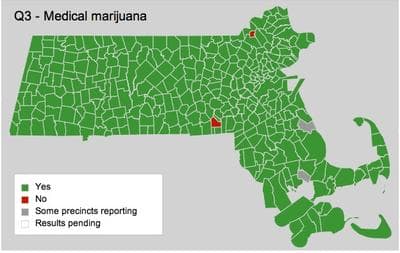Advertisement
A Smoky Path For Medical Marijuana In Mass.

BOSTON — Massachusetts will soon become the 18th state in the nation to make marijuana legal for patients with a debilitating disease. On Tuesday, a strong majority, 63 percent of voters, approved the medical marijuana ballot question.
Many who voted “yes” Tuesday shared the sentiments of Claire Winthrop, from Sharon.
“I just think it’s ridiculous not to allow medical use of marijuana,” Winthrop said. Her husband, David, standing nearby, nodded in agreement.
Now, the task of turning the ballot question into law is largely in the hands of the state Department of Public Health. Here’s a short timeline:
- The law takes effect Jan. 1, 2013.
- The department will then have 120 days to clarify some key sections, including: Just what is a 60-day supply of marijuana? And, who will qualify to run the 35 marijuana dispensaries that are supposed to be up and running by the end of next year.
One thing is certain: The dispensaries will not be welcome in every city and town.
“We do not want these dispensaries in the town of Wakefield,” said Stephen Maio, the town administrator. The question is not settled. Wakefield residents will consider a ban on medical marijuana dispensaries at town meeting next week. Maio says town leaders will urge passage of the ban because they’re concerned that medical marijuana will increase drug use overall.
And, Maio said, “We feel there are incidents of crime around these facilities, that they bring down property values. We don’t have a medical facility where one of these might be convenient after you get your treatment. We just felt that this was not what we wanted to have in Wakefield.”
One idea afloat on Beacon Hill is a six-month delay of the law so that cities and towns would have time to look at the effects of medical marijuana. The Massachusetts Municipal Association supports the delay.
Law enforcement leaders are also hoping lawmakers will clarify parts of the law. Wayne Sampson, the director of the Massachusetts Chiefs of Police Association, says police aren’t sure who will oversee the dispensaries and enforce the use of marijuana for medical purposes.
“We believe that the petition was written in a way that’s going to make it very difficult for the state to set regulations, such as inspections,” Sampson said. “And we believe that the Legislature is going to have to step in to clarify some of the uncertainties.”
Then there’s the question of which doctors will sign certificates allowing patients to buy marijuana. The Massachusetts Medical Society is urging doctors to refrain from authorizing marijuana use. These certificates, by the way, are not prescriptions, and insurance does not cover the use of medical marijuana because, in part, it is still illegal under federal law.
In Rhode Island, medical marijuana dispensaries were authorized in 2009, but none exist yet. JoAnne Leppanen, director of the Rhode Island Patient Advocacy Coalition, says supporters of the law in Massachusetts must remain vigilant.
“It has been a bit of a process in Rhode Island,” Leppanen said, “and we have had to stay on top of it. If the focus is on the patients, then everything else will come into place.”
There are lots of details ahead: Will the state tax marijuana even though it doesn’t tax prescription drugs? Will employers allow workers to smoke or otherwise ingest marijuana on the job? Will medical marijuana be authorized for kids?
Gov. Deval Patrick, who expressed some concerns about the ballot question, said Wednesday that Massachusetts will “learn as we go” with medical marijuana, as the state has in other areas of health care reform.
This program aired on November 7, 2012. The audio for this program is not available.
